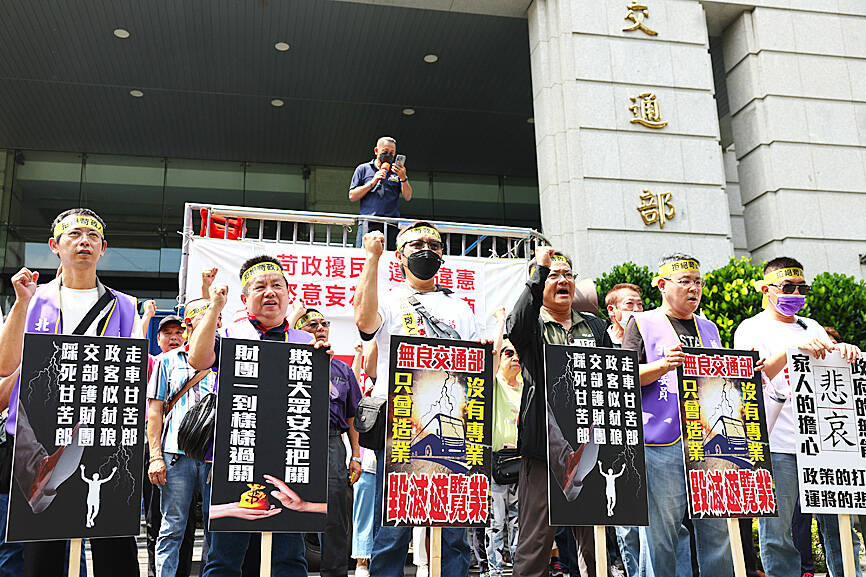Nearly 100 tour bus drivers yesterday protested outside the Ministry of Transportation and Communications in Taipei against a new Highway Bureau policy mandating that card readers be installed on tour buses by June next year to ensure that drivers do not exceed daily driving limits.
The new policy aims to ensure that the regulations on daily driving limits are thoroughly enforced.
Demonstrators, mostly independent tour bus drivers who own the buses they drive, parked 50 tour buses around the transportation ministry yesterday morning as part of the protest.

Photo: CNA
Protesters demanded that the GPS devices they are required to have not be connected to the bureau’s vehicle management system, that tour buses be considered part of public transportation systems, and that the government offer them a subsidy to install the card readers and cover maintenance fees.
They also demanded that data recorded on the GPS devices be turned over to the highway authority only after a major traffic incident, and that their hours be regulated based on flexible work hour rules stipulated in the Labor Standards Act (勞動基準法).
They threatened to hold a larger protest should the ministry refuse to grant their demands.
New Taipei City Tour Bus Drivers’ Union chairman Hsu Ching-hsiang (許景翔) said the ministry did not communicate with drivers before implementing the policy requiring the installation of GPS devices and card readers in tour buses.
“The ministry claimed that card readers should be installed to prevent tour bus drivers from being overworked, but GPS would start recording as soon as drivers start working. It would be gilding the lily if we must also install a card reader, which also has a camera to film drivers. This is an invasion of drivers’ privacy,” he said.
The cost of the card reader is about NT$5,200 to NT$5,500 (US$163.43 to US$172.86), and its maintenance fee is about NT$650 to NT$850 per month, Hsu said, adding that car reader service operators stand to gain more than NT$1.4 million in business.
“Independent tour bus drivers take out loans to buy their vehicles, and now they are forced to install GPS units and a card reader on board and must pay the expenses themselves. It is just unfair,” he said.
The bureau could set a one-year observation period to determine whether the GPS units should remain linked to the bureau’s system with motor vehicle offices, he said.
The requirement should remain if the number of incidents involving deaths or driving under the influence show no signs of improvement, he said.
However, bus drivers should be allowed to manage GPS data themselves if such incidents do not occur, he said.
“Tour bus drivers must not drive more than 11 hours per day, but they spend so much time stuck in freeway traffic,” Hsu said. “Rules of flexible work hours should apply to tour bus drivers, whose work hours should be counted based on the duration of time when the wheels are on the road. The performance review of tour buses and drivers should be lifted.”
Acting Minister of Transportation and Communications Chen Yen-po (陳彥伯) defended the GPS and card reader policy, saying that similar policies have already been implemented in other countries.
“With this system, schools organizing field trips for students requiring a tour bus can check the bus information recorded on the bureau’s app,” he said. “The safety of tour buses also helps as we try to attract international visitors.”
The bureau already has a plan to subsidize tour bus operators’ purchase of GPS units and card readers, he said, adding that he has asked bureau officials to communicate with tour bus drivers.

South Korean K-pop girl group Blackpink are to make Kaohsiung the first stop on their Asia tour when they perform at Kaohsiung National Stadium on Oct. 18 and 19, the event organizer said yesterday. The upcoming performances will also make Blackpink the first girl group ever to perform twice at the stadium. It will be the group’s third visit to Taiwan to stage a concert. The last time Blackpink held a concert in the city was in March 2023. Their first concert in Taiwan was on March 3, 2019, at NTSU Arena (Linkou Arena). The group’s 2022-2023 “Born Pink” tour set a

CPBL players, cheerleaders and officials pose at a news conference in Taipei yesterday announcing the upcoming All-Star Game. This year’s CPBL All-Star Weekend is to be held at the Taipei Dome on July 19 and 20.

The Taiwan High Court yesterday upheld a lower court’s decision that ruled in favor of former president Tsai Ing-wen (蔡英文) regarding the legitimacy of her doctoral degree. The issue surrounding Tsai’s academic credentials was raised by former political talk show host Dennis Peng (彭文正) in a Facebook post in June 2019, when Tsai was seeking re-election. Peng has repeatedly accused Tsai of never completing her doctoral dissertation to get a doctoral degree in law from the London School of Economics and Political Science (LSE) in 1984. He subsequently filed a declaratory action charging that

The Hualien Branch of the High Court today sentenced the main suspect in the 2021 fatal derailment of the Taroko Express to 12 years and six months in jail in the second trial of the suspect for his role in Taiwan’s deadliest train crash. Lee Yi-hsiang (李義祥), the driver of a crane truck that fell onto the tracks and which the the Taiwan Railways Administration's (TRA) train crashed into in an accident that killed 49 people and injured 200, was sentenced to seven years and 10 months in the first trial by the Hualien District Court in 2022. Hoa Van Hao, a